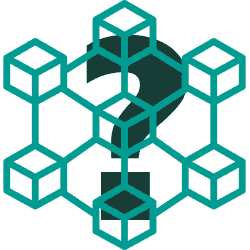
a question of blocks
Given our strong focus on security and data integrity, a blockchain-enabled system seems an obvious choice. That was certainly our thinking, but then we started to hear of successful penetrations of several crypro-currency blockchains. And that started us thinking again.
While we still believe blockchain to offer a higher level of security and immutability than traditional databases, the fact that it could be breached was the trigger for wider questions. And asking those questions revealed other shortcomings:
- the need for a large - and constantly available - network, usually with other-party components
- high storage requirement due to multiplied duplication of data
- resource providers require rewards - usually in the form of crypto currency
- high energy requirement
- slow response due to complex competition system to process data
- risk multiplied by the need for all peers to hold a full copy of data
This was enough to spur us to look deeper - and as answers to these shortcomings weren't forthcoming, we considered developing our own solution. Fortunately, that proved unnecessary when we found InterlockLedger.

what's special about InterlockLedger?
We knew that our requirement wouldn't fit existing blockchain solutions. We do things a little differently*, which is one reason why partnership is so important to us. We were looking, not just for a better technology, but for a company with a similar co-operative view to ours. From our first conversations with these guys, it was clear that we'd found one. They were enthusiastic about our aims, and quickly set about the developments needed to create the perfect fit. The result was that both of us ended up with a better product.
But it's not just their attitude that impressed us. The technology behind their blockchain represents a drastic re-think of the principles of secure distributed ledgers. Instead of a massive network, it can operate fully from as few as two nodes - and even works offline. It achieves its immutability by an ingenious system of interlocking - hence the name - that locks each new block of information with an encrypted key that also adds a new layer of locking to all previous blocks. Information can be readily shared with authorised parties, but the locks mean no one can change the information. Each contibutor automatically places its own private lock on the information, which then receives a further lock from each of the other contributors.
InterlockLedger vs conventional blockchain
| conventional blockchain | InterlockLedger |
|---|---|
| requires large, power-hungry network | needs as few as two nodes |
| requires constant availability of a quorum of peers | can operate offline |
| requires a reward system such as crypto or tokens | no reward requirement |
| each peer must store a duplicate of full data | each peer has its own data and can append third party data as required | data verification requires data to be open to all peers | data integrity is verified by all peers while actual data is private |
| trust built on network consensus and rewards | trust built on mutual witnessing of data integrity |
The signed block model opened up immediate opportunities for us. Global banking uses the SWIFT messaging system, which is known and trusted worldwide. However, its restricted information capacity means that little detail can be passed regarding the transaction or its counterparties. InterlockLedger makes it possible for us to embed a hash key in the MT103 payment message, allowing authorised parties visibility of unlimited background information at the click of a link. And the seamlessness of the connections we've worked out together allows us to record, not just every transaction, but every counterparty, document and decision throughout a customer's history. Should an SAR ever be required, preparation couldn't be simpler as it's all stored like a financial movie - a movie that's also an immutable source of truth.
* to be honest, we do most things quite a lot differently
